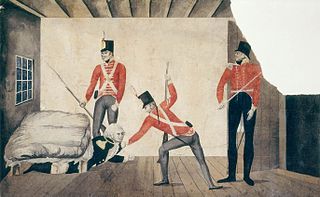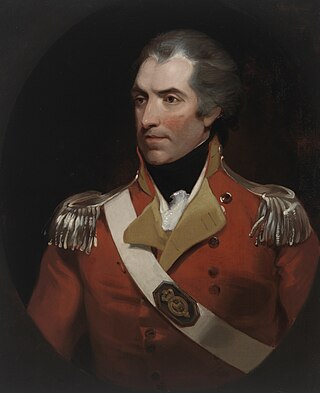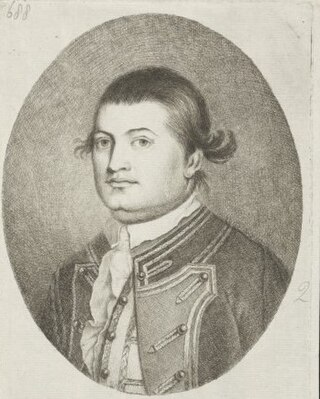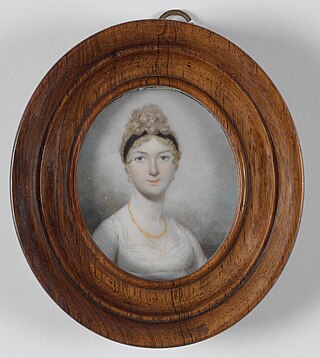| |||||
| Decades: | |||||
|---|---|---|---|---|---|
| See also: | |||||
The following lists events that happened during 1794 in Australia.
| |||||
| Decades: | |||||
|---|---|---|---|---|---|
| See also: | |||||
The following lists events that happened during 1794 in Australia.

The Rum Rebellion of 1808 was a coup d'état in the then-British penal colony of New South Wales, staged by the New South Wales Corps in order to depose Governor William Bligh. Australia's first and only military coup, the name derives from the illicit trade of rum in early Sydney, over which the 'Rum Corps', as the New South Wales Corps became known, had maintained a monopoly. During the first half of the 19th century, it was widely referred to in Australia as the Great Rebellion.

Vice Admiral John Hunter was an officer of the Royal Navy, who succeeded Arthur Phillip as the second Governor of New South Wales, serving from 1795 to 1800.

Philip Gidley King was a British politician who was the third Governor of New South Wales.
The New South Wales Corps, sometimes known as The Rum Corps was a regiment of the British Army, formed in England in 1789, to relieve the New South Wales Marine Corps, which had accompanied the First Fleet to Australia. In the Colony of New South Wales, the New South Wales Corps gained notoriety for its trade in rum and mutinous behaviour.

Colonel William Paterson, FRS was a Scottish soldier, explorer, Lieutenant Governor and botanist best known for leading early settlement at Port Dalrymple in Tasmania. In 1795, Paterson gave an order that resulted in the massacre of a number of men, women and children, members of the Bediagal tribe.

John Macarthur was a British Army officer, entrepreneur, landowner and politician who was a highly influential figure in the establishment of the colony of New South Wales. He was also a pioneer of the Australian Merino wool industry, and was instrumental in agitating for, and organising, a rebellion against Governor William Bligh in what is now termed as the Rum Rebellion in January 1808.
The following lists events that happened during 1788 in Australia.
The following lists events that happened during 1790 in Australia.
The following lists events that happened during 1791 in Australia.
The following lists events that happened during 1792 in Australia.
The following lists events that happened during 1793 in Australia.
The following lists events that happened during 1795 in Australia.
The following lists events that happened during 1796 in Australia.
The following lists events that happened during 1797 in Australia.

Lieutenant-General Francis Grose was a British soldier who commanded the New South Wales Corps. As Lieutenant Governor of New South Wales he governed the colony from 1792 until 1794, in which he established military rule, abolished civil courts, and made generous land-grants to his officers. He failed to stamp out the practice of paying wages in alcoholic spirits, with consequent public drunkenness and corruption. Although he helped to improve living conditions to some degree, he was not viewed as a successful administrator.
The following list contains events that happened during 1800 in Australia.
The following lists events that happened during 1805 in Australia.

Lieutenant-Colonel George Johnston was a British military officer who served as Lieutenant-Governor of New South Wales, Australia after leading the rebellion later known as the Rum Rebellion. After serving as a young marine officer in the American Revolutionary War, Johnston served in the East Indies, fighting against the French, before volunteering to accompany the First Fleet to New South Wales. After serving as adjutant to Governor Arthur Phillip, Johnston served in the New South Wales Corps and he was a key figure in putting down the Castle Hill convict rebellion in 1804. He led his troops in deposing Governor Bligh in the Rum Rebellion in 1808; which led to his court martial and subsequent cashiering from military service. In his later life, he returned to New South Wales as a private citizen, raising a family in the colony and establishing a successful farm around Annandale in Sydney.
The following lists events that happened during 1814 in Australia.

Mary Bligh, Lady O'Connell (1783–1864) was the Lady of Government House, New South Wales, Australia during the period her father William Bligh was the Governor of New South Wales.